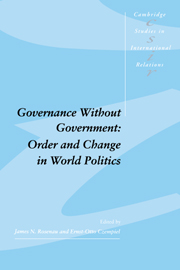Book contents
- Frontmatter
- Contents
- Notes on contributors
- Preface
- 1 Governance, order, and change in world politics
- 2 Governance without government: polyarchy in nineteenth-century European international politics
- 3 The decaying pillars of the Westphalian temple: implications for international order and governance
- 4 The “triumph” of neoclassical economics in the developing world: policy convergence and bases of governance in the international economic order
- 5 Towards a post-hegemonic conceptualization of v/orld order: reflections on the relevancy of Ibn Khaldun
- 6 The effectiveness of international institutions: hard cases and critical variables
- 7 Explaining the regulation of transnational practices: a state-building approach
- 8 “And still it moves!” State interests and social forces in the European Community
- 9 Governance and democratization
- 10 Citizenship in a changing global order
- Index
4 - The “triumph” of neoclassical economics in the developing world: policy convergence and bases of governance in the international economic order
Published online by Cambridge University Press: 13 October 2009
- Frontmatter
- Contents
- Notes on contributors
- Preface
- 1 Governance, order, and change in world politics
- 2 Governance without government: polyarchy in nineteenth-century European international politics
- 3 The decaying pillars of the Westphalian temple: implications for international order and governance
- 4 The “triumph” of neoclassical economics in the developing world: policy convergence and bases of governance in the international economic order
- 5 Towards a post-hegemonic conceptualization of v/orld order: reflections on the relevancy of Ibn Khaldun
- 6 The effectiveness of international institutions: hard cases and critical variables
- 7 Explaining the regulation of transnational practices: a state-building approach
- 8 “And still it moves!” State interests and social forces in the European Community
- 9 Governance and democratization
- 10 Citizenship in a changing global order
- Index
Summary
Order and governance in international relations are related to each other in a variety of complex ways. Governance is essentially purposive and should be distinguished from order, which does not require conscious purpose or intention. Order can exist without governance, but governance requires some form of order. At least three different types of order can be distinguished.
At the most basic level, world order can be conceptualized as a cohesive system of ideas (or a world view) mutually or intersubjectively shared by a group of individuals, including those located in different communities across territorial boundaries. This cohesive system of ideas and normative values encompasses ideas about political and economic systems, conceptions of religion (and its role), ontological and epistemological assumptions, a sense of mission in the world, a conception of the scope of that world, practices of legitimation, and ways of ordering, creating, and forgetting history. In this sense, one could talk about an American liberal world order vision, a Soviet socialist world order conception, or an Islamic world order view. Different world orders coexist, at times with mutual incomprehension, and are interpenetrated by one another. Although they may be associated with a state actor at a given moment in time (i.e., the U.S., the Soviet Union, or Iran in the examples cited above) and rely on that state actor for their extension, their presence or absence as world orders are not limited to, or exclusively contained within, any particular state.
- Type
- Chapter
- Information
- Governance without GovernmentOrder and Change in World Politics, pp. 102 - 131Publisher: Cambridge University PressPrint publication year: 1992
- 45
- Cited by

